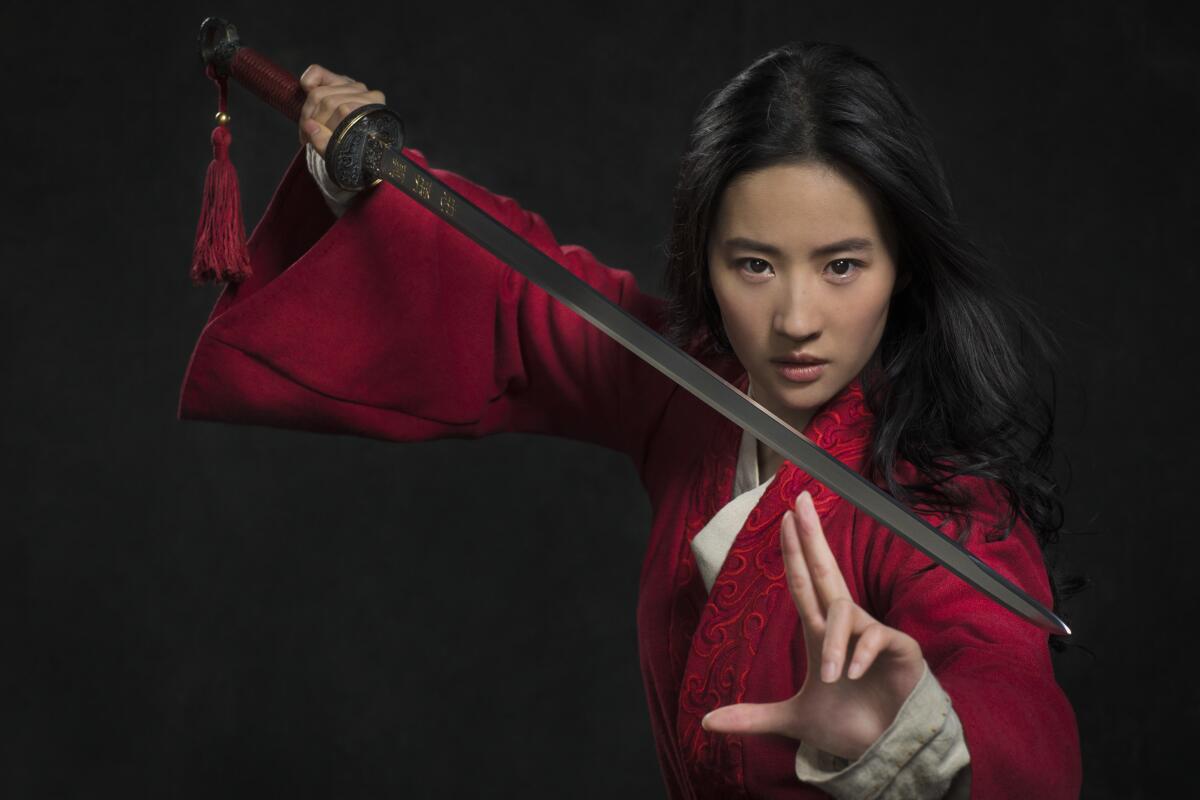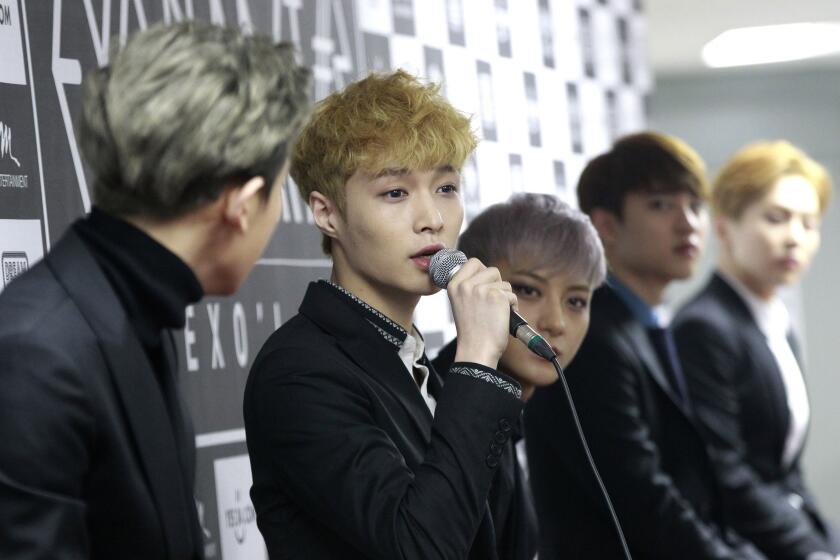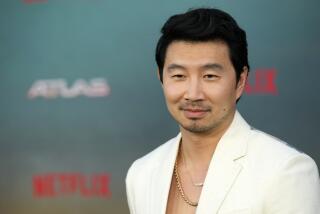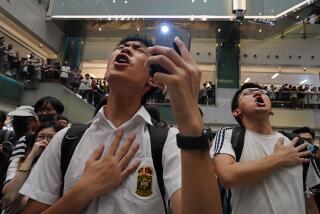Analysis: #BoycottMulan in support of Hong Kong protests tests Disney and moviegoers

- Share via
The star of an upcoming Disney blockbuster has ignited a fight that few could have wanted.
Liu Yifei, the lead in Disney’s upcoming “Mulan” live-action remake, used social media to take the side of Hong Kong police in the midst of pro-democracy protests that have sparked accusations of police brutality.
Unrest escalated after a June 9 march, with an estimated 1-million-plus participants, in response to a proposed law that would have given mainland China more power over Hong Kong residents. Amnesty International and other groups have released statements condemning the official use of force: “In the footage Amnesty has verified, police officers appear out of control, placing peaceful protesters who posed no threat in danger of serious injury.”
HONG KONG (AP) — At least eight K-pop stars from China and even one from Taiwan and one from Hong Kong are publicly stating their support for Beijing’s one-China policy, eliciting both disappointment and understanding from fans.Many of the statements came after protesters opposed to Beijing’s growing influence over semi-autonomous Hong Kong tossed a Chinese flag into Victoria Harbour.Lay Zhang, Jackson Wang, Lai Kuan-lin and Victoria Song are among those who recently uploaded a Chinese flag to social media and declared themselves “one of 1.4 billion guardians of the Chinese flag.”
The Chinese American Liu (a.k.a. Crystal Liu) posted her support for the Hong Kong police on the Chinese site Weibo on Thursday. She began by sharing an image from the state-run People’s Daily, repeating the now-viral words of Fu Guohao, a reporter for the Communist Party-run Global Times. In the viral video, Fu is accosted by antigovernment protesters: “I support the Hong Kong police. You can beat me up now.”
Liu added another post, in which she ended all doubt of her position: “I also support the Hong Kong police,” buttressed by emojis such as hearts and flexing arms.
By 11 a.m. Pacific time Friday, there were more than 65,000 tweets hashtagged “#BoycottMulan.”
For those embroiled in the actual struggle in Hong Kong, the stakes couldn’t be higher, sometimes coming down to life and death. For those on the cinematic side, there’s a lot on the table as well.
Disney’s live-action remakes have been wildly successful, with four topping the $1-billion mark in grosses, despite mostly unenthusiastic reviews, and another, “The Jungle Book,” just below $1 billion and earning widespread acclaim. “Mulan” is reported to have a budget around in the $300 million. It couldn’t be a shareholder’s dream to see #BoycottMulan and calls to recast its lead — a Chinese superstar — trending.
Recasting Liu seems unlikely; the film wrapped production last November. That leaves Disney in a dicey situation, considering its courting of the Chinese market, where its films have grossed billions. Eight Disney movies have earned more than 1.18 billion yuan ($168 million) each, placing them among the country’s top 50 all-time grossers. Their aggregate box-office total in China is in excess of $2 billion.
Disney’s “Doctor Strange” screenwriter C. Robert Cargill, in defending the change of the Marvel character the Ancient One from a Tibetan man in the comics to a white woman in the film (played by Tilda Swinton), said on the Double Toasted podcast, “If you acknowledge that Tibet is a place, and that he is Tibetan, you risk alienating 1 billion people who think that that’s bull and risk the Chinese government going, ‘Hey, you know, one of the biggest film-watching countries in the world? We’re not going to show your movie because you decided to get political….’ ”
Cargill’s response expresses a real problem that a number of major Western acts have faced. Björk, Bon Jovi, Lady Gaga and Maroon 5 are among the performers banned in China for meeting with the Dalai Lama or supporting Tibetan independence.
Calls to Disney for an official statement went unanswered at the time of this writing.
Asian and Asian American representation onscreen has long been a battleground, with major gains in recent years. “Crazy Rich Asians” is the first all Asian American-cast film to break $100 million domestically ($238.5 million worldwide). And Asian men have been showing up in unprecedented numbers as love interests in American films. Even the world-dominating Marvel Cinematic Universe, after years of whitewashing controversies in which Asian characters were recast with white actors, as in “Doctor Strange,” is poised to topline a franchise with an Asian actor for the first time (“Shang-Chi and the Legend of the 10 Rings”). To support the boycotting of a Disney blockbuster that retells a Chinese legend, remakes a beloved animated film and stars an Asian cast with an Asian female lead is a double-edged sword. The Times reached out to prominent figures in the Asian American media scene for comment, some of whom have been vocal about representation, but none responded.
For the performers themselves, speaking out against the mainland government can prove devastating to careers. Those voicing views in opposition to Beijing’s policies often face the erasure of their presence in a market of nearly 1.4 billion people. Chinese artists routinely speak in support of the government, under perceived pressure to do so. Entertainers such as Hong Kong actress Charmaine Sheh and 16-year-old Taiwanese singer Chou Tzu-yu have publicly atoned for words and actions deemed offensive by the Chinese government, often with apologies such as Chou’s “There is only one China.”
Others, such as iconic actor Chow Yun-Fat, have taken pro-democracy stands anyway. Singer Denise Ho supported pro-democracy protests in 2014 (the “Umbrella Movement”), joining in the protests herself, and has been blacklisted in China. She has continued her activism, telling the United Nations Human Rights Council in Geneva last week that “China is preventing our democracy at all costs.”
Other major stars in “Mulan,” such as Gong Li and martial-arts icons Jet Li and Donnie Yen, have remained silent on the protests. But several Chinese pop stars have expressed strong support of the government. Lay Zhang, who became a star with the K-pop band Exo and has a solo singing and acting career, not only canceled a Hong Kong concert, he ended his contract as a Samsung brand ambassador because the company includes separate language options for customers in Taiwan, Hong Kong and China. “The act of being ambiguous about the integrity of our sovereignty and territory has seriously hurt the national feelings of Chinese compatriots,” read a statement from his studio. Jackson Wang, who was born in Hong Kong but is based in South Korea, and Victoria Song also used Weibo to count themselves among the “1.4 billion guardians of the Chinese flag” — a “One China”-themed statement.
When martial arts legend Jackie Chan made statements calling the events “sad and depressing,” hoping Hong Kong could “return to peace soon” but also saying he wanted to “express the most basic principles of patriotism as a Hong Kong citizen and a Chinese. I am a national flag guard,” he sparked a sharp response from pro-democracy advocates.
Twitter users such as Grace Randolph (of “Beyond the Trailer”) noted this possible context for Liu’s remarks:
Many other Twitter users responded to Liu’s comments by posting photos and video of police clashing with unarmed protesters at the Hong Kong airport:
Some used humor to address the situation. One referred to Scarlett Johansson’s unfortunate history with playing a character that had always been Asian in “Ghost in the Shell” and her abortive casting as transgender in the film “Rub and Tug”:
Not all Tweeters were against Liu’s speaking out, however:
Liu, who gained American citizenship while living in the United States from roughly ages 10 to 15, is a superstar, considered one of the “New Four Dan,” or four most bankable, actresses in China. She has 65 million followers on Weibo. As for the tweets with the trending #BoycottMulan hashtag,Twitter is banned in China.
Staff writer Alice Su contributed to this report.

More to Read
Only good movies
Get the Indie Focus newsletter, Mark Olsen's weekly guide to the world of cinema.
You may occasionally receive promotional content from the Los Angeles Times.












